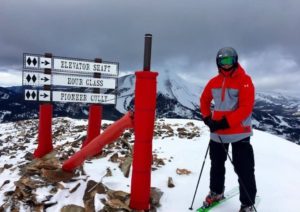 Glen Guyton is chief operating officer and director of Convention Planning for Mennonite Church USA.
Glen Guyton is chief operating officer and director of Convention Planning for Mennonite Church USA.
This is a message to the next generation of church leaders.
A few weekends ago I had the privilege of speaking to high school youth at Rocky Mountain Mennonite Camp.
During free time I decided to hurl my 46-year-old body down an icy hill with only an inner tube and my excess body fat to protect me.

Tom Brady skiing, Facebook photo
I mean, I am no Tom Brady, but I have been known to take a risk or two. As I was speeding toward the bottom of the hill a few things came to mind.
My first thought was, “Man! I sure hope I don’t break anything.”
My second thought was, “I’m too old for this.”
And finally I thought, “Maybe we need less stewardship and a few more shepherds in our church.”
It was a weird sequence of thoughts, but that is what happens when your brain is deprived of oxygen at high altitudes.
Seriously though, I think our organization has enough people managing the status quo. Stewards are good caretakers of what is, but we also need leaders who are willing to charge headfirst down the hill. We need shepherds who will go out in search of the marginalized and who understand the need to cultivate new pastures. Unfortunately, I am moving ever closer to that steward role, but that is one of the reasons I love connecting with youth and young adults.
They still hope. They still believe in an unadulterated vision of the church, and they have not been beaten down by the day-to-day grind of our bureaucracy. They don’t have time to sit stagnant in circles of holy hierarchy. No, they move; they live; they explore.
A good steward will sit comfortably on top of the mountain and gaze at all that is under their authority. A good steward manages assets and does everything in his or her power to preserve the institution. But being a shepherd means climbing daily up and down the hill, caring for your flock. While good stewards sit in the sanitized isolation of rooms and offices, shepherds carry the stench of the wilderness.
The good shepherd carries upon their person the muck and mire of those they serve. The shepherd will have to get his or her hands dirty on a regular basis in order to ensure the safety, well-being, and prosperity of the flock. Life in the wilderness, on the mountainside is often unpredictable.
While the wise steward can typically fall back on policies and procedures, the good shepherd often has to improvise, adapt and overcome a myriad of challenges to make it through the day.
On my first run, I made it down the hill without much trouble. But as I was getting ready for my second run, a young kid in his tube took me out. I wound up face down in the snow, with a deep gash in my pride. The pity was clear in their voices as several teenagers rushed to my aid, asking me if I was alright. Deep down I knew what they were thinking, “Poor old man. He should be in the cabin resting his bones, not hanging on the mountain with us.”
Maybe they were right. Maybe I have been a steward too long and my shepherd past is fading fast. Yet those teens from Mountain States and Western District conferences failed to realize that it is people just like them that give me the desire and the energy to take the hill just one more time.
Stewards serve an important role in each and every organization, including ours. But shepherds are just as important to lead and guide us into more viable pastures.

